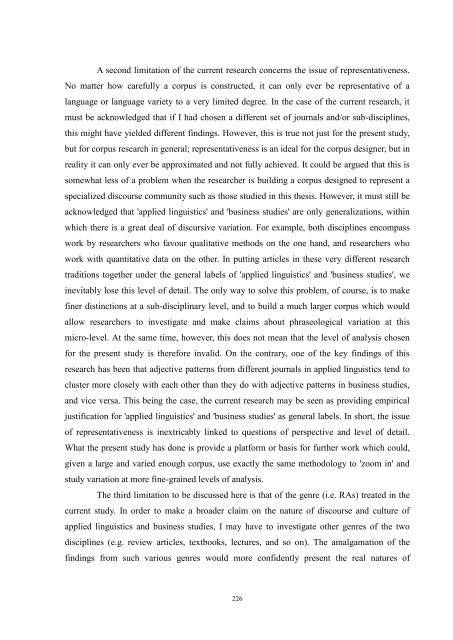Evaluative Meanings and Disciplinary Values - eTheses Repository ...
Evaluative Meanings and Disciplinary Values - eTheses Repository ...
Evaluative Meanings and Disciplinary Values - eTheses Repository ...
Create successful ePaper yourself
Turn your PDF publications into a flip-book with our unique Google optimized e-Paper software.
A second limitation of the current research concerns the issue of representativeness.<br />
No matter how carefully a corpus is constructed, it can only ever be representative of a<br />
language or language variety to a very limited degree. In the case of the current research, it<br />
must be acknowledged that if I had chosen a different set of journals <strong>and</strong>/or sub-disciplines,<br />
this might have yielded different findings. However, this is true not just for the present study,<br />
but for corpus research in general; representativeness is an ideal for the corpus designer, but in<br />
reality it can only ever be approximated <strong>and</strong> not fully achieved. It could be argued that this is<br />
somewhat less of a problem when the researcher is building a corpus designed to represent a<br />
specialized discourse community such as those studied in this thesis. However, it must still be<br />
acknowledged that 'applied linguistics' <strong>and</strong> 'business studies' are only generalizations, within<br />
which there is a great deal of discursive variation. For example, both disciplines encompass<br />
work by researchers who favour qualitative methods on the one h<strong>and</strong>, <strong>and</strong> researchers who<br />
work with quantitative data on the other. In putting articles in these very different research<br />
traditions together under the general labels of 'applied linguistics' <strong>and</strong> 'business studies', we<br />
inevitably lose this level of detail. The only way to solve this problem, of course, is to make<br />
finer distinctions at a sub-disciplinary level, <strong>and</strong> to build a much larger corpus which would<br />
allow researchers to investigate <strong>and</strong> make claims about phraseological variation at this<br />
micro-level. At the same time, however, this does not mean that the level of analysis chosen<br />
for the present study is therefore invalid. On the contrary, one of the key findings of this<br />
research has been that adjective patterns from different journals in applied linguistics tend to<br />
cluster more closely with each other than they do with adjective patterns in business studies,<br />
<strong>and</strong> vice versa. This being the case, the current research may be seen as providing empirical<br />
justification for 'applied linguistics' <strong>and</strong> 'business studies' as general labels. In short, the issue<br />
of representativeness is inextricably linked to questions of perspective <strong>and</strong> level of detail.<br />
What the present study has done is provide a platform or basis for further work which could,<br />
given a large <strong>and</strong> varied enough corpus, use exactly the same methodology to 'zoom in' <strong>and</strong><br />
study variation at more fine-grained levels of analysis.<br />
The third limitation to be discussed here is that of the genre (i.e. RAs) treated in the<br />
current study. In order to make a broader claim on the nature of discourse <strong>and</strong> culture of<br />
applied linguistics <strong>and</strong> business studies, I may have to investigate other genres of the two<br />
disciplines (e.g. review articles, textbooks, lectures, <strong>and</strong> so on). The amalgamation of the<br />
findings from such various genres would more confidently present the real natures of<br />
226
















